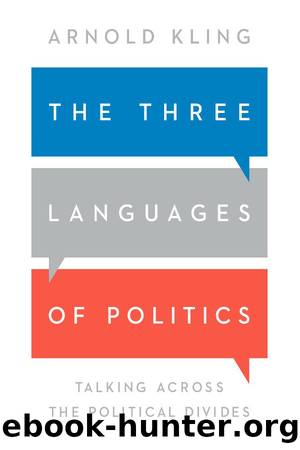The Three Languages of Politics: Talking Across the Political Divides by Arnold Kling

Author:Arnold Kling
Language: eng
Format: mobi
Tags: bethani, ian, theron, ronda, Hannah, Kelsey, audiobook, pay_royalty_done, Art_Recommend_adult, Sierra_Tyler, Willa_Colombia, jesse, brenden
ISBN: 9781944424466
Publisher: Cato Institute
Published: 2017-05-09T07:00:00+00:00
11
Donald Trump and the Three-Axes Model
Donald Trump shook up the political landscape. In hindsight, one can say that he capitalized on a public mood of suspicion toward established elites and what is called the âliberal international order.â
In his important book The Revolt of the Public, Martin Gurri points out that the latest communications media have empowered new popular movements everywhere, from the Arab Spring to Brexit. Gurri paints a picture of a nihilistic public, offended by what they see as a corrupt and inept ruling class.
It is well to recall that in the United States, the electorate has long had an ornery streak. Voters frequently hop on bandwagons to support relatively inexperienced presidential candidates running against Washington veterans: Jimmy Carter vs. Gerald Ford in 1976, Ronald Reagan vs. Carter in 1980, Bill Clinton vs. George H. W. Bush in 1992, Barack Obamaâs primary challenge against Hillary Clinton in 2008, and Obama vs. John McCain in 2008.
In only one presidential election in my lifetime has a candidate with considerable Washington experience defeated an outsider. That was in 1988, when the elder Bush trounced former Massachusetts governor Michael Dukakis.
One can see Trumpâs defeat of Clinton as more typical of the pattern in which voters prefer political innocence to experience. It seems that a significant segment of the American public views Washington as corrupt and alien. Clintonâs experience may well have been a handicap. Many Americans instead are enamored of the ideal of the amateur citizen-crusader.
Yet Trump was an extreme case. Unlike any previous successful outsider candidate, he gained almost no endorsements from major party figures in his campaign for the Republican presidential nomination. And unlike Obama, for example, Trump had to fight through mostly negative media coverage.
To the extent that one can find a coherent theme to the publicâs revolt that brought Trump to Washington, it would appear to be one of trying to minimize Americaâs exposure to globalization. In the 2017 edition of this book, and drawing on David Brooksâs Bobos in Paradise: The New Upper Class and How They Got There, I suggested that Trump mobilized voters who were anti-Bobo. The Bobos are the cosmopolitan âbourgeois bohemians,â Brooksâs term for the contemporary American elite, who seem more at home in Prague than in Peoria.
In his book, published in 2000, Brooks illustrated elite taste by listing some prominent individuals whom he believed the Bobos regarded as insufficiently intellectual to merit respect. First among those was Donald Trump. Today, many Bobos despise Trump and his supporters, and the feeling is mutual.
A cosmopolitan vs. nationalist conflict has emerged in other countries as well. Italians elected a government consisting of two parties that disagree on virtually everything other than opposition to the cosmopolitan elite. Nationalist, anti-elite sentiment also has found expression in elections in the United Kingdom, Germany, France, and Eastern Europe.
Thus, the triumph of Donald Trump probably should not be viewed as a victory for purely traditional conservatism. Instead, the Trump coalition added some anti-cosmopolitan swing votes to those of traditional conservatives, even as the candidate alienated a few of the more cosmopolitan conservatives.
Download
This site does not store any files on its server. We only index and link to content provided by other sites. Please contact the content providers to delete copyright contents if any and email us, we'll remove relevant links or contents immediately.
| Anthropology | Archaeology |
| Philosophy | Politics & Government |
| Social Sciences | Sociology |
| Women's Studies |
Born to Run: by Christopher McDougall(7121)
The Leavers by Lisa Ko(6945)
iGen by Jean M. Twenge(5409)
Sapiens by Yuval Noah Harari(5366)
Spare by Prince Harry The Duke of Sussex(5180)
The Kite Runner by Khaled Hosseini(5170)
Machine Learning at Scale with H2O by Gregory Keys | David Whiting(4295)
Bullshit Jobs by David Graeber(4179)
Never by Ken Follett(3937)
Goodbye Paradise(3802)
Livewired by David Eagleman(3765)
Fairy Tale by Stephen King(3370)
A Dictionary of Sociology by Unknown(3077)
Harry Potter 4 - Harry Potter and The Goblet of Fire by J.K.Rowling(3061)
The Social Psychology of Inequality by Unknown(3019)
The Club by A.L. Brooks(2919)
Will by Will Smith(2911)
0041152001443424520 .pdf by Unknown(2843)
People of the Earth: An Introduction to World Prehistory by Dr. Brian Fagan & Nadia Durrani(2733)
